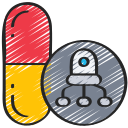
Transforming Healthcare: The Role of AI in Personalized Treatment
Artificial Intelligence is spearheading a revolution in healthcare, reshaping how treatments are designed, delivered, and optimized for individual patients. Personalized treatment, powered by AI-driven insights, is closing the gap between traditional, generalized care and unique patient needs. The integration of advanced algorithms, data analytics, and machine learning is enabling healthcare professionals to better understand complex health patterns, predict patient outcomes, and recommend the most effective interventions. As this transformation accelerates, it holds enormous potential to improve lives, enhance healthcare efficiency, and foster better patient-provider relationships on a global scale.
AI technologies are fundamentally changing how vast quantities of medical data are interpreted. Traditional analysis often relied on human review, which is time-consuming and susceptible to oversight, especially with complex data like genomics or imaging scans. AI algorithms quickly sift through layers of information—ranging from electronic health records to real-time monitoring devices—identifying patterns and anomalies invisible to the human eye. This capability drastically reduces diagnostic errors, promotes early detection of illnesses, and allows practitioners to make more informed decisions based on comprehensive, up-to-date datasets tailored to each patient.
The Emergence of AI in Healthcare
AI-Powered Personalization in Treatment Planning
Tailoring Therapies to Genetic Profiles
Genomics has opened a window into the biological uniqueness of every patient, but interpreting such complex data is a daunting task. AI excels in reading, comparing, and learning from genetic information, allowing providers to match therapies to the individual molecular characteristics of each person. This is particularly impactful for areas like oncology, where subtle genetic differences can dictate which drugs or therapies will be most effective. The result is an approach that maximizes treatment efficacy while minimizing unnecessary side effects, marking a profound shift toward truly individualized patient care.
Dynamic Monitoring and Adjustment of Treatments
Another critical advantage of AI-driven personalization lies in its ability to continuously update treatment plans based on real-time data. Wearable devices, remote sensors, and mobile apps now provide constant streams of patient information, which AI can use to detect subtle changes in health status or treatment response. Rather than waiting for scheduled check-ups, care teams can intervene proactively when issues arise. AI recommendations provide insights for adjusting medications, dosages, or therapies, ensuring that each patient remains on the most effective, least risky course of care as their condition evolves.
Empowering Shared Decision-Making
AI not only supports clinicians but also empowers patients by making complex information more understandable and actionable. Interactive platforms and digital assistants leverage AI to translate clinical findings and options into everyday language, enabling patients to actively engage in choosing their treatments. This collaboration fosters trust, improves adherence to care plans, and encourages individuals to take a more informed role in managing their health, ultimately leading to better satisfaction and improved health outcomes.
Overcoming Challenges in Personalized AI Healthcare
The effectiveness of AI in personalized healthcare hinges on access to vast and sensitive patient datasets. Protecting this information against breaches, unauthorized access, or misuse is paramount. Secure data handling protocols, robust encryption methods, and transparent consent processes are essential to maintaining trust between patients and health providers. As AI systems evolve, continuous vigilance and adaptation of security measures are necessary to ensure that patient privacy is never sacrificed in the pursuit of technological progress.
AI algorithms are only as objective as the data on which they are trained. If training datasets are biased or unrepresentative, the resulting recommendations can inadvertently perpetuate existing health disparities. It’s critical for developers and healthcare organizations to scrutinize AI tools for potential bias, regularly audit outcomes, and strive for inclusivity in data collection. This proactive approach helps ensure that AI-driven healthcare solutions benefit all populations, regardless of background, ethnicity, or socioeconomic status.
The true promise of AI in personalized medicine depends on its successful integration within real-world healthcare environments. This means developing tools that complement, rather than disrupt, the workflows of practitioners and health systems. AI must be designed to support, not replace, the expertise of clinicians—serving as a resource that enhances decision-making, reduces administrative burden, and streamlines case management. Engaging healthcare professionals in the development and implementation process is vital to creating solutions that are both clinically effective and practically usable.

